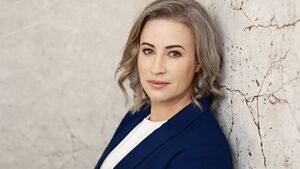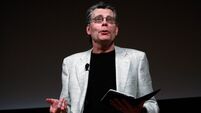Giving up one career to help others find theirs

Castlebar woman Treasa Fitzgibbon gave up a high-powered banking job in New York to relocate back to Mayo and set-up her own business, The Career Activist.
From the very top of her game in banking, to coaching women to get into senior management roles in the corporate world, Tréasa Fitzgibbon gives whatever she is doing 100%.
Castlebar raised, Tréasa ended up in banking somewhat by accident after she finished secondary school but carved a very successful career in the sector in Dublin, London and New York. However, a life coaching course that she undertook for her own development, ended up taking her down a different career path with The Career Activist, that is now thriving. I sat down with Tréasa to find out more about her story.
Tréasa, thanks for talking to me. Tell me a little about yourself?
I am a Mayo girl, not quite born, but raised, definitely. I was born in Dublin and I have two younger sisters. When my second sister was about two, my parents decided to relocate back to Mayo. My mum is Castlebar born and bred, my dad's a Cork man. So we moved to Mulranny first of all in 1983 and spent a year there. Then we came to Castlebar, and I went to school in St Angela's and then St Joseph's and I repeated my Leaving Certificate in Davitt College. To be honest I was quite an immature 17 or 18-year-old, I would say. As in, I didn't know what I wanted to do. Studying was not something I found very easy, I was smart but not able to apply. I decided to take a gap year, and I wanted to go to the UK and thought maybe I was going to do something like sports science there because I absolutely love sport. Then my mum saw an advertisement in the newspaper for Citibank coming to Dublin and she was like, "I'm putting your name in."
So she did that and that took you on the next part of your journey?
Nine interviews later, I think, I got to the job at Citi. They'd had a small branch in Dublin for 30 years but this was when they started to expand and build. When I started there was 35 of us, and there's now about 1500 to 1600 people working in Citibank in Dublin. I spent about seven years at Citi in Dublin and then I relocated with them to London. I spent about 10 years in London, not all at Citi. I did about three years with Citi, three years at HSBC, and then moved to Bank of America.
What kind of roles would you have had within those organisations?
In the early days at Citi it was what we would have called operations. Then gradually I got promoted into a team leader role, and then into a manager’s role and my last job in Dublin would have been running service teams. Then when I moved to London I stepped out of management and went back into individual contributors and did corporate sales for a long time. I stayed with them for around 10 years in total. I moved to New York with them in 2013 and that was back into management. I was running a global sales team, and I stayed there until 2019. Then I decided to pack it all in!
So how did that come about, Tréasa?
Back in 2015 I decided I wanted to get a life coach. Work was going great, but I felt at sometimes to the detriment of everything else in life, and I've always been fascinated with, why do some people set goals and always achieve them, and why do some people find it hard? Why are some people super positive? I decided in 2016 I was going to study to be a coach but had no intention of ever being a coach. It was just something I'm interested in. I'm very fortunate, I never hated my day job, I liked what I did, I travelled a lot, I got to see the world. But I hit that point, when I was doing my hours to get my certification, that I felt I was enjoying this more than I was enjoying the day job, and plus, my mum had been sick around that time and I'd been away for a long time. So in 2019, I decided to take what I call my gap year, but at 40 instead of 18 or 22. I left in April 2019 and then pretty much spent the rest of the year travelling. I came back to Ireland in Christmas 2019. I had a one way ticket to Bali booked for March 2020. I was going to set up my company and work from there, and then Covid happened. I am now a bit more of a hybrid digital nomad. It depends on the year and what's going on, but, eight, nine, months of the year I'll spend here, and then I'll go away somewhere to find the sun and work somewhere else.
So tell me about the business you've set up?
I wanted to work with women only because I feel, not that men don't face challenges, but the challenges that women face are different. I can recognise them more and I think I can add more value and help more. I started asking, where can I add value? I realised it was in career sector. That's where I had done very well and a lot of the women I work with aspire to the roles I had. I would have ended my career as a managing director and what I was passionate about is where the gaps existed at certain managerial levels. People come in as an analyst and then they go to an associate vice-president, director, managing director. Up until about VP, it's about 50-50 men and women. Get to director level and that changes to maybe 70-30, it depends on the organisation and even within an organisation, and by the time you get to MD, that's more like 80-20, sometimes 70-30, but rare. I started to realise I didn't really need to help the analysts and the associates, there didn't seem to be a problem there. It was that middle bit of VP and directors where I was and know that we are losing a phenomenal amount of talent, and there's a bunch of different reasons. The women who are working incredibly hard, maybe they want promotions, maybe they don't, but they're working incredibly hard, and they don't feel they're getting whatever that recognition is, either top performance, better pay, maybe they're not comfortable negotiating. For me, there's the two sides of it. I'm helping the women navigate the world as it is in their careers, but also helping educate them that the more of them who hopefully get into senior roles, the more they can change it.
What strikes me about the success you've had Tréasa is that you haven't followed the traditional third level route?
No. There was a period in my career where I probably had a bit of a chip on my shoulder about that. One of the things that coaching was really helpful for was breaking down some of those limiting beliefs that I had. I had this belief of, "Well, I'm not as smart as everybody." But what I learned was, well, I'm not as educated, but educated and smart are two very different things, and just because I'm not as educated doesn't mean I'm not as smart.
What keeps you driven?
I think a couple of things. One is unfairness. I feel like there's a phenomenal amount of women out there who deserve better than they're getting. Whether that's better pay, promotions, just being treated better, that's a big drive for me. I love seeing people grow, including myself. Then the final part is, I am one of three girls, but I also have three nieces. I don't want them to have to fight the same battles we fought. My mum's generation had it way worse than us. I'm child free by choice. Both of my sisters have children. What they're saying about our generation, and maybe, 10 and 15 years before, is the first generation was told, you can have it all, but we still expect you to carry the load when it comes to the house and motherhood and whatever, and I just see women who come on calls to me, and they're like, "Okay, I'm crap," and then they describe what they're doing, and I'm like, "How are you even surviving all of this?" Because they describe an incredibly stressful job, children, partner, maybe elderly parents, caregiving, you name it; all they're doing is berating themselves that they're not doing anything good enough, and I'm like, "If only by the end of our time together, you can see yourself how I see you, that's progress." But also, in the nicest way possible, forcing male partners to step up and carry an equal load. Hopefully my nieces don't face the same load.
What advice would you give someone who is thinking about taking a leap of faith workwise?
The biggest shift for me was going from a secure monthly salary and a very nice monthly salary at the time to the uncertainty. What I would say is every decision we make in life has trade-offs and trade-ons. That's the trade-off I met – the salary and consistency. But what did I trade-on? For me the big thing was freedom. Family is another thing. I lived in New York, which was fabulous, but I wouldn't have been here for my nieces if I had stayed there. Thankfully they've all been born since I came home. But if I'd stayed in New York, I'd be missing that and those relationships, helping my parents as they've got older. Realise that there is no right decision, there's what's right for me right now, and I can change it. Even if you're fearful of being an entrepreneur, you're only making a decision for right now. None of these decisions are permanent. In a year's time, you might go, ‘I'm glad I tried. It didn't quite go the way I wanted. I'm going to go and find a full-time job as an employee, or who knows.’ The other thing is not to let other people's opinions steer you. I had a lot of that when I was leaving the bank. Be brave, be courageous, and be okay with the fact that it might fail. So what? I'd much rather say I tried it, and it didn't work out, than I never had the courage to give it a go.





